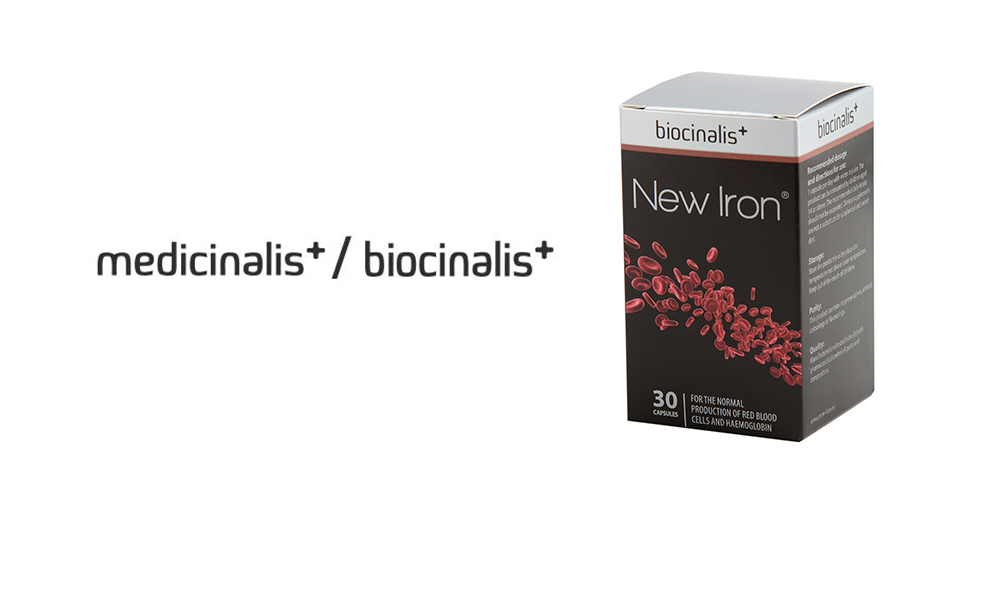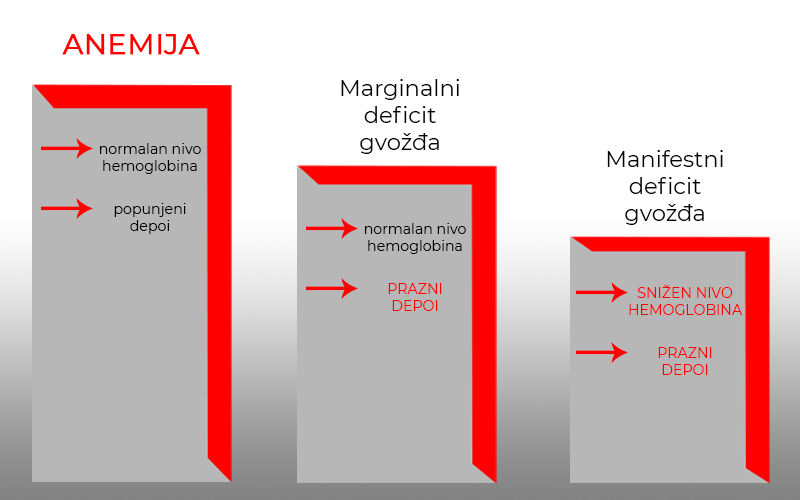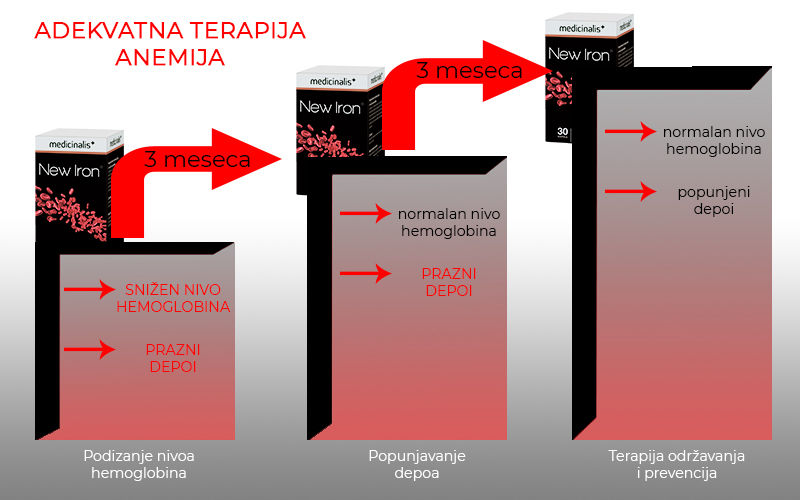New Iron®
The compensation of iron without a feeling of nausea
New Iron® represents a glycin-aminoacid chelatic complex of iron with the addition of vitamin B12, folic acid and vitamin C with the following superior characteristics:
- NEW IRON – small and stable molecules without ionic charge, which makes this complex resistant to the effect of the stomach acid and enzymes, and as such, enables further undisturbed resorption in the intestines
- NEW IRON – has no undesired effects such as nausea, constipation and digestion problems, in comparison with iron sulphate the usage of which is often connected with these undesired effects
- NEW IRON – 70-75% better absorption and four times greater bioavailability in comparison with the sulphuric form of iron NEW IRON – no absorption of other vitamins or minerals is inhibited
- NEW IRON – contains folic acid and vitamin B12. Anaemia is caused by the deficiency of iron, vitamin B12 and folic acid, so it is important to take all the three components at the same time
- NEW IRON – also contains vitamin C which additionally improves the absorption of iron
- NEW IRON – capsule coating is made of hydroxypropyl-methylcelulose (HPMC) which makes it convenient for vegetarians and vegans as well
New Iron® content:
- Fe-bisglycinate 90 mg
- Folates 400 µg – contribute to the process of blood production and the development of tissue during pregnancy. Contribute to the reduction of fatigue and the feeling of tiredness
- B12 9 µg – contributes to the production of red blood cells, cellular proliferation, normal metabolism and boosting of energy, as well as to the function of the immune system.
- Vitamin C 180 mg –improves the absorption of iron and contributes to the normal functioning of the immune system, reduces fatigue and the feeling of tiredness.
New Iron® – iron aminoacid chelatic complex with the addition of vitamins represent a selected combination for:
- pregnant women and those who are breastfeeding
- women in the reproductive period
- adolescents
- athletes
- vegans and people on vegetarian diet
Recommended dosage and usage:
- one capsule a day with water or juice
- the product can be used by children aged 14 and older
- does not contain artificial colours, sweeteners or preservatives
Anaemia
Anaemia is defined as an absolute decrease of the total mass of erythrocytes.
It occurs secondarily due to bleeding chemolysis or the decrease in the production of red blood cells.
In practice, anaemia is considered the decrease in the concentration of haemoglobin in blood.
According to the criteria of the WHO, anaemia is defined as the concentration of haemoglobin (Hb) in blood lower than:
- 130 g/l or haematocrit (Hct) lower than 39% in adult men and
- 120 g/l or haematocrit (Hct) lower than 37% in adult women
Anaemia due to the deficiency of iron (sideropenic anaemia) is the most common form of anaemia which occurs when there is not enough iron in the organism for the production of haemoglobin in the red blood cells.
The main causes of the occurrence of this kind of anaemia are bleeding and the conditions that reduce the absorption of iron in the intestines. It is most common in children, pregnant women and women in the generative period.
The deficiency of iron is the most present nutritive deficit in about 25% of people in the world.
Anaemia
Anaemia is defined as an absolute decrease of the total mass of erythrocytes.
It occurs secondarily due to bleeding chemolysis or the decrease in the production of red blood cells.
In practice, anaemia is considered the decrease in the concentration of haemoglobin in blood.
According to the criteria of the WHO, anaemia is defined as the concentration of haemoglobin (Hb) in blood lower than:
- 130 g/l or haematocrit (Hct) lower than 39% in adult men and
- 120 g/l or haematocrit (Hct) lower than 37% in adult women
Anaemia due to the deficiency of iron (sideropenic anaemia) is the most common form of anaemia which occurs when there is not enough iron in the organism for the production of haemoglobin in the red blood cells.
The main causes of the occurrence of this kind of anaemia are bleeding and the conditions that reduce the absorption of iron in the intestines. It is most common in children, pregnant women and women in the generative period.
The deficiency of iron is the most present nutritive deficit in about 25% of people in the world.

Causes of anaemia
- increased needs – children, pregnant women, athletes…
- insufficient intake – vegetarians, restrictive diets…
- reduced absorption of iron – diseases of gastrointestinal tract, older people…
- bleeding
Research has showed that only 2-14% of iron from non-organic salts are resorbed in the organism. Due to the ionically connected iron in these compounds disorders in the absorption of other minerals (Ca, Mg, Mn) and vitamins (vitamin C and E) can occur.
Before the development of the real deficit (anaemia), marginal deficit of iron occurs, which leads to the series of non-specific symptoms and is often unnoticed.


Write to us
Mosorska 9, 11000 Belgrade, Serbia
Vemax011 Pharma doo representative office Northern Macedonia - Dane Krapcev 13, Skopje
Vemax011 Pharma doo representative office Montenegro - Topliški put 1, Budva
Vemax011 Pharma doo representative office Bosnia and Hercegovina - Vlakovo 252, Sarajevo
+381 (0)63 103 00 08
office@vemaxpharma.rs
Vemax Pharma - your trusted regional partner on the road to health!
